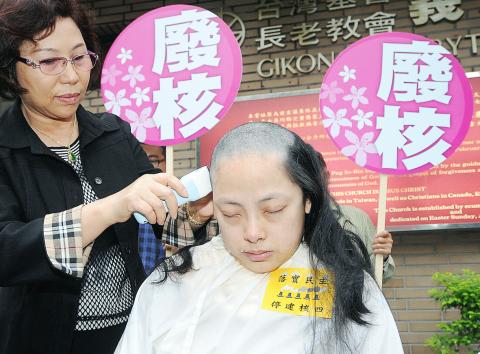As the indefinite hunger strike by former Democratic Progressive Party (DPP) chairman Lin I-hsiung (林義雄) enters its fourth day today, President Ma Ying-jeou (馬英九) is to meet with DPP Chairman Su Tseng-chang (蘇貞昌) to address Lin’s demands.
The 73-year-old Lin began his hunger strike on Tuesday demanding that the Ma administration respect the will of the people and halt construction of the Fourth Nuclear Power Plant in New Taipei City’s Gongliao District (貢寮).
Insisting that the decades-long issue should be put to a vote in a referendum in accordance with the Referendum Act (公民投票法), Ma has brushed off suggestions to resolve the crisis, including those proposed by several lawmakers from his own party, the Chinese Nationalist Party (KMT).

Photo: Fang Pin-chao, Taipei Times
The Referendum Act has been dubbed a “birdcage” law that is structurally flawed so that any referendum is doomed to fail, mainly because of its high thresholds.
Premier Jiang Yi-huah (江宜樺) met with KMT lawmakers at 5pm yesterday to ensure the lawmakers toe the party line, ahead of a meeting of the legislative plenary session today in which the DPP plans to table a statute that would allow a referendum on the plant to be decided by a simple majority vote.
After two-and-a-half hours of discussions, Jiang convinced some KMT lawmakers, who had earlier advised the government to respond positively to the demands made by Lin and the DPP to end Lin’s hunger strike, to change their positions.
The two conclusions reached at the meeting strictly followed what Ma and Jiang proposed.
First, the government will proceed with construction of the plant and ongoing safety checks and tests, but it will not install fuel rods and will not activate the plant until a referendum is held to decide whether it can be put into operation.
Second, all KMT lawmakers are required to attend the legislative meeting today to block the DPP’s plans to pass the special statute, or else they will face party discipline.
Earlier yesterday, KMT Legislator Lin Yu-fang (林郁方) told a group of reporters that he was against the idea of putting the issue to a referendum.
Lin said at the time that he would suggest that the legislature pass a resolution allowing the Executive Yuan to announce, without having to hold a referendum, that the construction of the plant will continue to completion and safety checks and tests will be performed, but the plant will not be activated.
KMT Legislator Lee Ching-hua (李慶華) had said that the Executive Yuan should announce a halt to the construction of the plant immediately after the legislature adopts a resolution to support its proposed plan to scrap the facility.
KMT lawmakers Alex Tsai (蔡正元), Su Ching-chuan (蘇清泉) and Chiang Hui-chen (江惠貞), among others, who had floated other proposals, did not force their ideas through at the meeting.

The Taiwanese passport ranked 33rd in a global listing of passports by convenience this month, rising three places from last month’s ranking, but matching its position in January last year. The Henley Passport Index, an international ranking of passports by the number of designations its holder can travel to without a visa, showed that the Taiwan passport enables holders to travel to 139 countries and territories without a visa. Singapore’s passport was ranked the most powerful with visa-free access to 192 destinations out of 227, according to the index published on Tuesday by UK-based migration investment consultancy firm Henley and Partners. Japan’s and

NATIONAL SECURITY THREAT: An official said that Guan Guan’s comments had gone beyond the threshold of free speech, as she advocated for the destruction of the ROC China-born media influencer Guan Guan’s (關關) residency permit has been revoked for repeatedly posting pro-China content that threatens national security, the National Immigration Agency said yesterday. Guan Guan has said many controversial things in her videos posted to Douyin (抖音), including “the red flag will soon be painted all over Taiwan” and “Taiwan is an inseparable part of China,” while expressing hope for expedited “reunification.” The agency received multiple reports alleging that Guan Guan had advocated for armed reunification last year. After investigating, the agency last month issued a notice requiring her to appear and account for her actions. Guan Guan appeared as required,

Japan and the Philippines yesterday signed a defense pact that would allow the tax-free provision of ammunition, fuel, food and other necessities when their forces stage joint training to boost deterrence against China’s growing aggression in the region and to bolster their preparation for natural disasters. Japan has faced increasing political, trade and security tensions with China, which was angered by Japanese Prime Minister Sanae Takaichi’s remark that a Chinese attack on Taiwan would be a survival-threatening situation for Japan, triggering a military response. Japan and the Philippines have also had separate territorial conflicts with Beijing in the East and South China

A strong cold air mass is expected to arrive tonight, bringing a change in weather and a drop in temperature, the Central Weather Administration (CWA) said. The coldest time would be early on Thursday morning, with temperatures in some areas dipping as low as 8°C, it said. Daytime highs yesterday were 22°C to 24°C in northern and eastern Taiwan, and about 25°C to 28°C in the central and southern regions, it said. However, nighttime lows would dip to about 15°C to 16°C in central and northern Taiwan as well as the northeast, and 17°C to 19°C elsewhere, it said. Tropical Storm Nokaen, currently